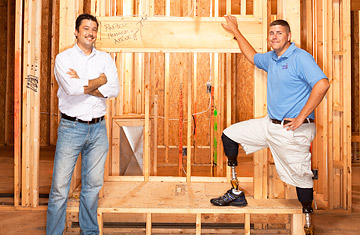
(3 of 5)
In the beginning, IAVA was overtly antiwar and fairly political. "We hate the war but love the Army," Rieckhoff told me in 2006. He helped found an organization called VoteVets, which supported Democratic veterans running for Congress. "But pretty soon I saw that there were other vets who favored the war and were running for office too — and I didn't want to work against them. We separated IAVA from VoteVets. And I've got to say that if Pete Hegseth, a Republican, who started Veterans for Freedom, ran for office, I'd work for him. I'd work for any veterans running for office because I know their values."
This is a common sentiment among the new generation of vets turned pols. They feel closer to one another than they do to either political party. The three Democratic veterans elected to Congress in 2006 were supplanted by seven Republican veterans in subsequent elections. When Tommy Sowers, a Special Ops officer, ran a losing campaign for Congress as a Missouri Democrat in 2010, one of his major fundraisers was Jason Lewis, a Republican who is now an investment banker. "We worked together as Special Operators," Lewis told me, "and I was immediately impressed by Tommy. Everyone is. He has exceptional aptitude, the ability to break a complicated problem down into its component parts very quickly." Between operations, Sowers and Lewis argued about economics. "Tommy was something of a Keynesian. I was more of an economic classicist. But our philosophical differences weren't nearly as important as the values we had in common." (Sowers told me that if Lewis wants to run for Congress, he'll happily reciprocate and raise money for him.)
Many returning veterans follow politics closely. "One thing about the military was, it forced you to learn," says Gallina. "If you were willing to learn, you could rise fast — so we all became avid readers, and we've carried that through back home." They aren't thrilled by what they see. They tend to view public life through the prism of military values — which are, at times, contradictory. There is a basic altruism. Gallina intuitively expanded the notion that you don't leave a fallen comrade in the field to include the veterans of other wars; from there, it's a short jump to including civilians as members of their community too. Veterans are trained to believe that everyone in their unit rises and falls together. "In the military, it's never about you," Lewis told me. "It's always about something larger."
But there is another, competing and decidedly conservative sense that is common to veterans: that American society has gone soft and is filled with whiners, an entitlement culture lacking a sense of individual accountability. One veteran who served in Congress described his whining civilian colleagues as "a professional bed-wetting society." Indeed, it is hard to imagine a value structure more different from military life than the national political culture of blather and complaint. "The toughest part of leadership is telling people they have to do something that involves pain," says Eric Greitens, a former Navy SEAL who runs a program for badly wounded returning veterans called the Mission Continues. "We had to do that every day: 'At 0100 we're going to stage a raid. The enemy is heavily armed and waiting for us. I can't promise you we're going to accomplish this without casualties. But we need to take out this cell of snipers.' You just don't find many politicians willing to get people to do tough things."
And while there is general admiration for fellow veterans who run for office, some of the most impressive members of this generation have a disdain for public life. "I just don't believe that politics needs to be total combat," says Nathaniel Fick, a former Marine and Dartmouth classics major who now is president of CNAS and whose friends continually press him to run for office. "I've seen total combat. I wouldn't want to give up my privacy and expose my family to the craziness the system seems to require. My kid is not a prop. Anyway, most of my friends feel politically homeless," he adds, acknowledging that neither party reflected the combination of service and get-it-done pragmatism most veterans value. "But I do believe that we have something important to contribute. We know how to lead."
How to Build a Leader
"The main reason why I chose west Point over Yale," says McNally, who now works for McKinsey & Co., "is that it was a complete experience, not just academically but a serious physical challenge — and in leadership as well. You get real responsibility very quickly: in Germany, I was 22 and leading 30 people who didn't have a college education. And I had to make it work. Most of the college grads I know who didn't join the military don't know 30 people without a college education."
McNally's parents were mildly horrified by her decision. Her dad, Dr. Richard Young, a pediatric neurologist who has taught for 30 years at Yale, said the toughest moment was dropping her off at West Point. "They announced, 'You have exactly one minute to kiss your loved one goodbye,'" Young told me. "At other colleges, you at least get to help them unpack." But he quickly adjusted to being a military dad. "I was always the sort of dad who became the soccer coach." So he decided to enlist in the Connecticut National Guard. He has done four tours as a combat physician in Iraq and says, "These are the most diverse and extraordinary people I've ever met. I'd love to see the values and ethics of the military spread into the general population."
